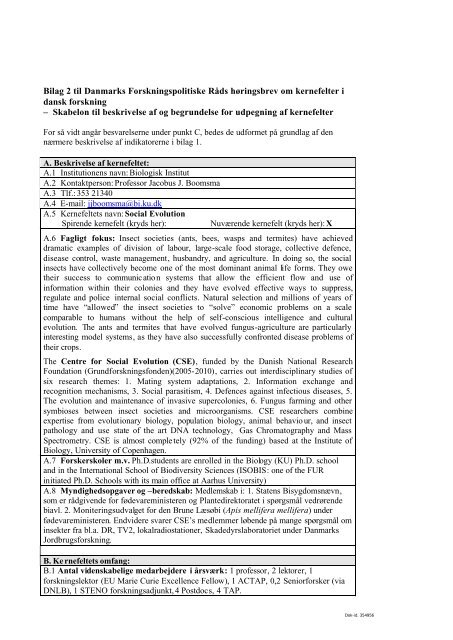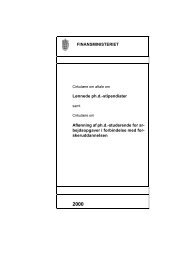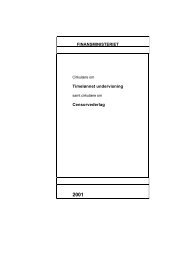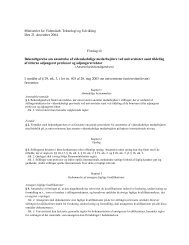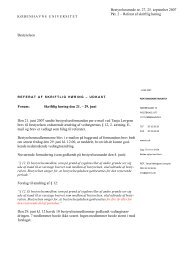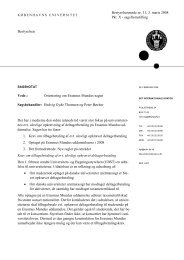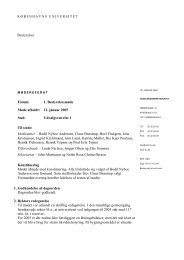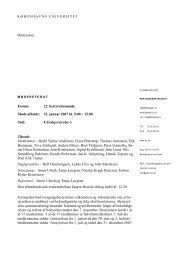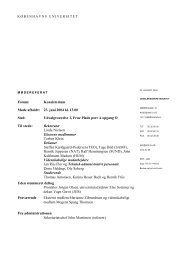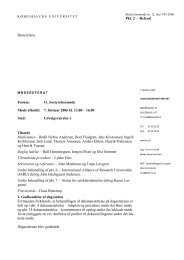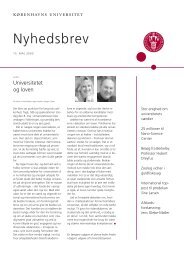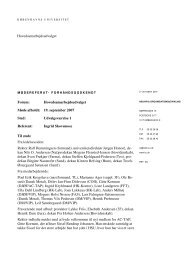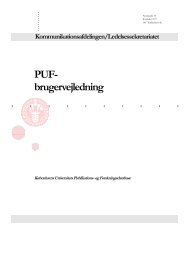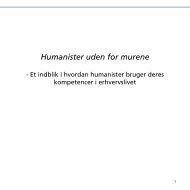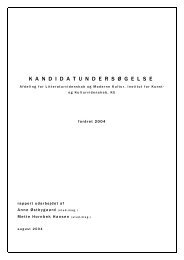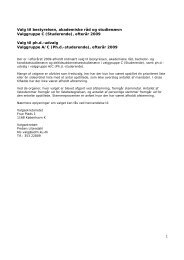Rektor Linda Nielsen Københavns Universitet Nørregade 10 1017 ...
Rektor Linda Nielsen Københavns Universitet Nørregade 10 1017 ...
Rektor Linda Nielsen Københavns Universitet Nørregade 10 1017 ...
Create successful ePaper yourself
Turn your PDF publications into a flip-book with our unique Google optimized e-Paper software.
Bilag 2 til Danmarks Forskningspolitiske Råds høringsbrev om kernefelter i<br />
dansk forskning<br />
– Skabelon til beskrivelse af og begrundelse for udpegning af kernefelter<br />
For så vidt angår besvarelserne under punkt C, bedes de udformet på grundlag af den<br />
nærmere beskrivelse af indikatorerne i bilag 1.<br />
A. Beskrivelse af kernefeltet:<br />
A.1 Institutionens navn: Biologisk Institut<br />
A.2 Kontaktperson: Professor Jacobus J. Boomsma<br />
A.3 Tlf.: 353 21340<br />
A.4 E-mail: jjboomsma@bi.ku.dk<br />
A.5 Kernefeltets navn: Social Evolution<br />
Spirende kernefelt (kryds her): Nuværende kernefelt (kryds her): X<br />
A.6 Fagligt fokus: Insect societies (ants, bees, wasps and termites) have achieved<br />
dramatic examples of division of labour, large-scale food storage, collective defence,<br />
disease control, waste management, husbandry, and agriculture. In doing so, the social<br />
insects have collectively become one of the most dominant animal life forms. They owe<br />
their success to communication systems that allow the efficient flow and use of<br />
information within their colonies and they have evolved effective ways to suppress,<br />
regulate and police internal social conflicts. Natural selection and millions of years of<br />
time have “allowed” the insect societies to “solve” economic problems on a scale<br />
comparable to humans without the help of self-conscious intelligence and cultural<br />
evolution. The ants and termites that have evolved fungus-agriculture are particularly<br />
interesting model systems, as they have also successfully confronted disease problems of<br />
their crops.<br />
The Centre for Social Evolution (CSE), funded by the Danish National Research<br />
Foundation (Grundforskningsfonden)(2005-20<strong>10</strong>), carries out interdisciplinary studies of<br />
six research themes: 1. Mating system adaptations, 2. Information exchange and<br />
recognition mechanisms, 3. Social parasitism, 4. Defences against infectious diseases, 5.<br />
The evolution and maintenance of invasive supercolonies, 6. Fungus farming and other<br />
symbioses between insect societies and microorganisms. CSE researchers combine<br />
expertise from evolutionary biology, population biology, animal behavio ur, and insect<br />
pathology and use state of the art DNA technology, Gas Chromatography and Mass<br />
Spectrometry. CSE is almost completely (92% of the funding) based at the Institute of<br />
Biology, University of Copenhagen.<br />
A.7 Forskerskoler m.v. Ph.D.students are enrolled in the Biology (KU) Ph.D. school<br />
and in the International School of Biodiversity Sciences (ISOBIS: one of the FUR<br />
initiated Ph.D. Schools with its main office at Aarhus University)<br />
A.8 Myndighedsopgaver og –beredskab: Medlemskab i: 1. Statens Bisygdomsnævn,<br />
som er rådgivende for fødevareministeren og Plantedirektoratet i spørgsmål vedrørende<br />
biavl. 2. Moniteringsudvalget for den Brune Læsøbi (Apis mellifera mellifera) under<br />
fødevareministeren. Endvidere svarer CSE’s medlemmer løbende på mange spørgsmål om<br />
insekter fra bl.a. DR, TV2, lokalradiostationer, Skadedyrslaboratoriet under Danmarks<br />
Jordbrugsforskning.<br />
B. Ke rnefeltets omfang:<br />
B.1 Antal videnskabelige medarbejdere i årsværk: 1 professor, 2 lektorer, 1<br />
forskningslektor (EU Marie Curie Excellence Fellow), 1 ACTAP, 0,2 Seniorforsker (via<br />
DNLB), 1 STENO forskningsadjunkt, 4 Postdocs, 4 TAP.<br />
Dok-id. 354956


